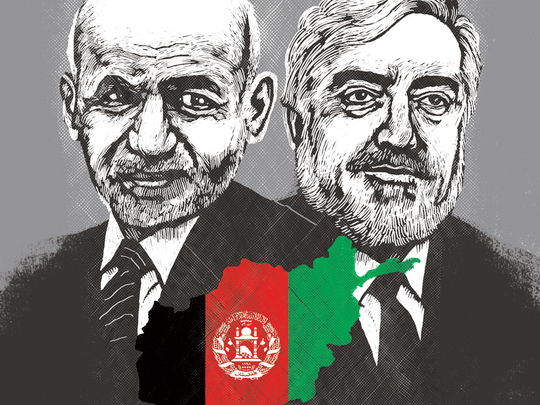
Ashraf Gani, the former finance minister and World Bank executive, will be inaugurated as President of Afghanistan on Monday. This follows the announcement of a potentially landmark power-sharing agreement last Sunday to create a “government of national unity” with Abdullah Abdullah, the former foreign minister. Media reports indicate that, following the disputed presidential ballot between Gani and Abdullah in June, up to a million of votes were thrown out for fraud. The final vote totals were not announced on Sunday, supposedly at Abdullah’s insistence, although several sources indicate Gani may have received 54-55 per cent of the vote and Abdullah 45-46 per cent.
Under the terms of the deal, Abdullah has been given the role of a de facto prime minister. A new Council of Ministers will be created, headed by him, which will implement the executive affairs of the government. Abdullah will report to the president on progress in implementing policies. There will reportedly be broad parity between Abdullah and Gani over selection of key personnel at the senior levels of the government.
While many in Afghanistan and internationally will be relieved by the deal, it could be fragile and has resulted from enormous US pressure. Apart from US Secretary of State John Kerry’s trips to Afghanistan since June, President Barack Obama has reportedly called each of the candidates three times since the runoff. Meanwhile, the US ambassador and other American diplomats met Gani and Abdullah around 40 times, and Karzai 15 times, since the election.
It is perhaps Abdullah on whom the success of the deal now rests most. He had previously asserted that the election result amounted to a “coup” against him. Only time will reveal whether he is fully reconciled to the result, which represents the first democratic transfer of power in the country’s history and also marks the end of the post-9/11 Hamid Karzai era. If the power-sharing arrangement between Gani and Abdullah proves a success, and there is an eventual reconciliation deal with the Taliban, last Sunday’s developments could consolidate the power and legitimacy of the new government. And, in turn, this would help preserve some of the fragile gains secured in Afghanistan since 2001.
If the government breaks down, however, there could be increased division, potentially along ethnic and/or geographic lines, in the country. For instance, Atta Mohammad Noor, a former warlord, Abdullah ally, and current governor of Balkh Province in northern Afghanistan, had previously threatened violence unless Abdullah was declared the winner of the election. A key issue here is that Gani and Abdullah have different regional and ethnic powerbases. Gani is from the south and part of the country’s majority Pashtun community, whereas Abdullah is from the north and his support base is concentrated in the ethnic Tajik community.
Now that a new government is in place, the country must seek to address the daunting array of political, economic and security risks on the horizon. Perhaps the number one item on the agenda is bolstering domestic security. Unlike Karzai, both Gani and Abdullah have endorsed the need for a deal with US and Nato forces to keep them in the country after December 31.
Major issues that will need to be resolved in the deal include: The fate of Taliban prisoners; extending immunity for US military personnel in the country; and any continuing US mandate to perform counter-terrorism mission in Afghanistan. These are points where the new government will walk a tightrope between keeping Washington on side, while not torpedoing any peace dialogue with the Taliban.
A security deal will reportedly see a remaining international force (US and Nato combined) of around 14,000 troops in 2015, which could be reduced significantly in 2016. The 2015 force will reportedly comprise an estimated 8,000 US personnel, and 4,000 Nato troops, supplemented by a reported 1,800 strong US counter-terrorism force. This continuing international presence will also help ensure extensive funding and training for the approximately 350,000-strong Afghan police and military forces, which may otherwise disintegrate.
While a continuing foreign force will provide a stabilising presence, Afghanistan nonetheless faces fresh assaults from the Taliban. Hence, the reason why another key priority will be advancing reconciliation in the country.
Pakistan’s influence could be key in facilitating any eventual peace deal. While doubts remain about that country’s ability and willingness to facilitate such an agreement, a potentially significant move was made earlier this year when Pakistani government representatives entered into formal peace talks with the Pakistani Taliban in North Waziristan.
Turning to the economic front, the new president will come into office at a very difficult moment. Since 2001, the fast-growing economy has become steadily more dependent on foreign aid. However, as international troops are withdrawn, foreign aid could be cut back markedly. In part, this is because US and Nato forces have provided a security umbrella under which some of the aid agencies have operated in recent years.
Another key problem is that there has been only very limited success in economic diversification since 2001. The danger is that, as aid is reduced, the economy becomes increasingly dependent upon drug exports such as opium and heroin. Taken overall, there is a limited window of opportunity for the government of national unity to consolidate its power and legitimacy and preserve gains in the country since 2001. However, especially if the administration does not function effectively, and reconciliation cannot be advanced with the Taliban, there is also a prospect of significantly greater political, security and economic instability in the country, even if a new international security deal is signed.
Andrew Hammond is an Associate at LSE Ideas at the London School of Economics. He was formerly a special adviser in the UK Government.












